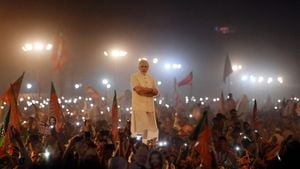Former U.S. President-elect Donald Trump has recently made head-turning comments on Turkey's pivotal role in the ousting of Syrian leader Bashar al-Assad. During a press conference on December 16, 2024, Trump described the rebel offensive, which resulted in Assad's removal, as what he deemed an "unfriendly takeover" by Turkey. This characterization highlights the complex and often contentious geopolitical relationships surrounding the Syrian conflict.
Assad’s ouster was engineered by various rebel groups, most prominently led by the Islamist faction Hayat Tahrir al-Sham (HTS), which has roots in Syria's branch of Al-Qaeda. The swift nature of this offensive took many observers by surprise, resulting not only in Assad’s dash for safety to Russia but also eliciting celebrations across Syria and beyond. Trump did not shy away from criticizing Assad, calling him "a butcher" and emphasizing his brutal treatment of children.
At the press conference held at his Mar-a-Lago estate in Florida, Trump articulated his view of Turkey’s significant military capabilities, stating, "Turkey is very smart... Turkey did an unfriendly takeover, without a lot of lives being lost." His comments acknowledged Ankara's long-standing opposition to Assad's regime, coupled with its extensive support for rebellious factions, which date back to the beginnings of the Syrian Civil War.
Turkey's involvement has often put it at the center of the conflict, hosting millions of refugees and supporting various rebel organizations aiming for regime change. Trump referenced Erdogan's military strength, saying, "Erdogan is somebody I got along with great... He's built a very strong, powerful army." This statement underlines the belief shared by many analysts about Turkey's growing influence as it asserts its role within the region.
Despite Trump’s supportive remarks, the situation remains complex. HTS, which spearheaded the uprising, is considered by several Western governments to be a terrorist organization, though they have attempted to moderate their stance and assure protection for religious minorities. The delicate balance of power is not lost on Trump, who indicated, "Turkey is going to hold the key to Syria," highlighting the uncertain future of the war-torn country.
Trump expressed ambivalence when discussing U.S. forces currently stationed in Syria, stating, "Nobody knows what the future holds for Syria." His administration had aimed to withdraw American troops, but shifting dynamics and pressures from allies, concerned about the rise of ISIS, complicated these plans. When directly questioned about troop disposition, he remained vague yet reinforced the notion of Turkey’s controlling hand over subsequent regional developments.
Reactions to the removal of Assad have varied significantly, with some viewing it as the potential start of renewed stability for Syria, whereas others raise concerns about the ensuing power vacuum and the risk of increased conflict among local factions. Importantly, Trump’s perspective seems to support the idea of continued Turkish involvement as instrumental to managing the challenges ahead.
Trump's comments also implicitly brought historical perspectives to the conversation, alluding to Turkey’s Ottoman past when discussing its ambitions over Syria. He remarked, "They've wanted it for thousands of years, and he got it… those people who went in are controlled by Turkey, and that's OK." This historical lens opens the discussion to broader themes of national identity, legacy, and the struggle for control within post-colonial frameworks.
The impact of these developments is palpable both regionally and globally. With Turkey’s military presence and intentions now under scrutiny, the geopolitical ramifications will likely continue to evolve. Washington has engaged Ankara on strategies to counter any resurgence of Islamic State militants, with Trump highlighting the necessity of these alliances as the future of Syria hangs precariously.
Despite the celebrations accompanying Assad’s downfall, many uncertainties remain, especially concerning the control and direction of the new opposition-led government. The situation calls for careful observation as shifting dynamics could lead to new alliances or conflicts between established powers.
Trump’s enthusiastic endorsement of Turkey’s role presents both opportunities and challenges. U.S.-Turkey relations will be integral moving forward, particularly as strategic interests align or diverge over Syria's future. Whether Turkey can stabilize the region and manage the ethnically and politically diverse reality on the ground remains to be seen, but its influence is unmistakably central to any future discourse surrounding Syria.
For now, Trump's remarks shine a light on Turkey’s rising prominence within the international arena, echoing his administration’s foreign policy direction endorsing strongman alliances even amid complex humanitarian concerns surrounding Syria’s conflict.



